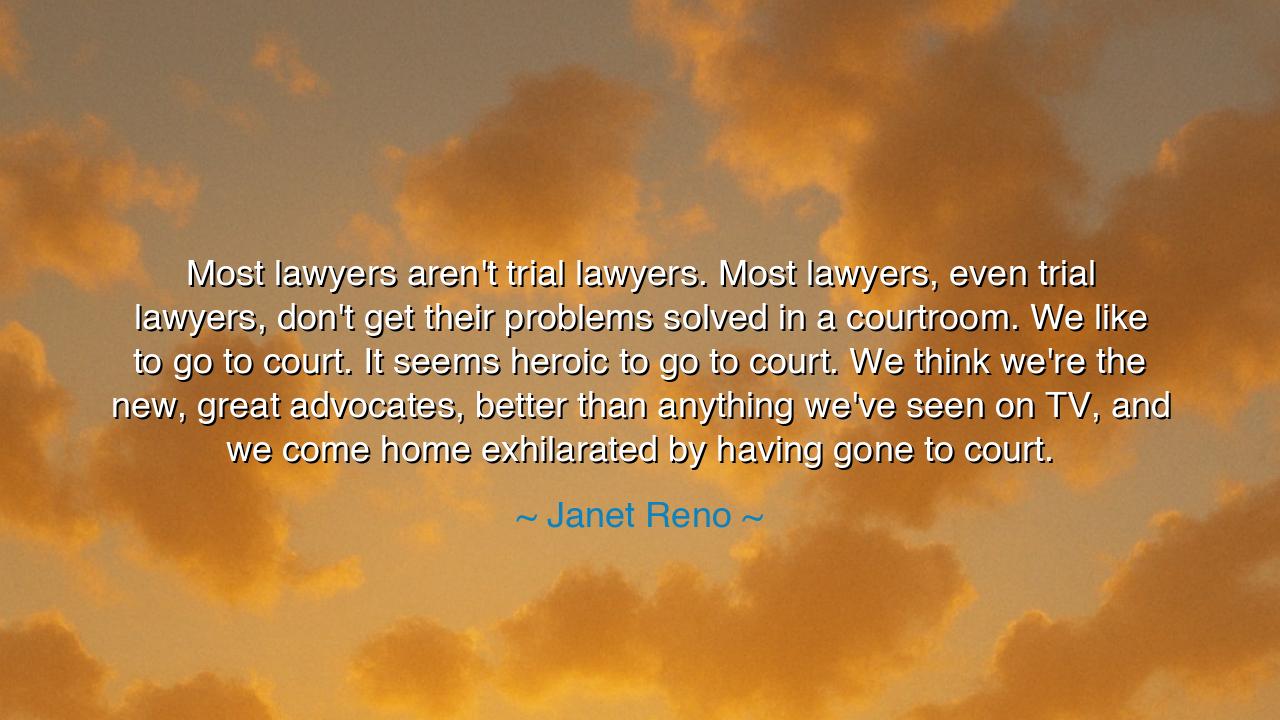
Most lawyers aren't trial lawyers. Most lawyers, even trial
Most lawyers aren't trial lawyers. Most lawyers, even trial lawyers, don't get their problems solved in a courtroom. We like to go to court. It seems heroic to go to court. We think we're the new, great advocates, better than anything we've seen on TV, and we come home exhilarated by having gone to court.






The words of Janet Reno—“Most lawyers aren’t trial lawyers. Most lawyers, even trial lawyers, don’t get their problems solved in a courtroom. We like to go to court. It seems heroic to go to court. We think we’re the new, great advocates, better than anything we’ve seen on TV, and we come home exhilarated by having gone to court”—speak with a depth of realism forged from long experience. Beneath their measured tone lies a reflection not only on the practice of law, but on the nature of human pride, illusion, and true service. Reno’s words unveil a powerful truth: that heroism is not found in spectacle, but in quiet resolution. The courtroom, with all its drama, is but a stage; the real work of justice, and indeed of life, is often done in silence, through patience, wisdom, and humility.
To “go to court” has long been seen as a symbol of righteousness and courage. The lawyer standing before a judge, defending the innocent or condemning the guilty, evokes images of ancient advocates—wise as Solomon, bold as Cicero. Reno acknowledges this allure, the heroic illusion that grips those who wield the law. Yet she cautions that this is not where truth most often resides. The real victory is not the thunder of the courtroom nor the admiration of spectators; it is the quiet moment when conflict is dissolved before it demands battle. For though the courtroom seems glorious, it is also a place of loss, where even the victor walks away bruised.
The ancients understood this lesson long before the age of modern law. The philosopher Confucius once said, “The wise man avoids litigation.” For to bring matters before a judge is to confess that reason and relationship have failed. True wisdom seeks reconciliation before retribution, understanding before accusation. Likewise, in the days of Rome, the statesman Cato the Younger was revered not because he won every argument, but because he upheld justice through integrity rather than performance. Janet Reno’s reflection, born from her years as America’s first female Attorney General, aligns with this ancient truth: that justice is not a contest, but a calling.
Her words also serve as a mirror for all who confuse action with purpose. “We think we’re the new, great advocates,” she says—a quiet rebuke to vanity. There is in every profession, not only law, a temptation to seek glory rather than goodness, to mistake noise for impact. But the world’s true advocates are not those who shout loudest, but those who listen most deeply. The greatest battles of justice are not waged before judges but in hearts and minds, in late-night negotiations, in acts of compromise, and in the courage to seek peace when ego demands war. Reno reminds us that the heroism of humility is greater than the exhilaration of conflict.
There is a story from the life of Abraham Lincoln, himself a lawyer before he became a president. Lincoln was known to discourage his clients from going to court whenever possible. “Discourage litigation,” he would say. “Persuade your neighbors to compromise whenever you can.” He knew that every case brought to trial meant two hearts hardening against one another. He understood that true advocacy is not about victory, but about restoration. Like Reno, he saw that the lawyer’s highest purpose was not to win arguments, but to heal divisions. And so he practiced what she preaches: that the greatest triumph is the one that ends in peace, not applause.
Yet Reno does not condemn the thrill of the courtroom entirely. She acknowledges the exhilaration, the surge of purpose that fills one who believes they fight for justice. But she invites us to see this emotion for what it is: a fire that must be tempered by reflection. To act with passion but without self-awareness is to lose sight of the cause itself. In her words, we are called to examine our motives—are we serving justice, or our own hunger for validation? The courtroom becomes a metaphor for all human endeavor: we must ask not only what we are doing, but why.
Thus, the lesson she offers is eternal. Do not mistake drama for duty, or glory for goodness. True service lies in the quiet, unseen labor that prevents conflict before it erupts, that mends what is broken without fanfare. Whether one is a lawyer, a leader, or a lover, let their actions be guided by purpose, not pride. Seek not to dazzle, but to do right. And when the world tempts you with applause, remember that the truest victories are not shouted from the steps of the courthouse, but whispered in the stillness of conscience.
So, my friends, let Reno’s wisdom be a guiding star: Heroism is not found in confrontation, but in resolution. The greatest advocates are not those who win cases, but those who prevent them; not those who return from battle triumphant, but those who avert battle altogether. Let your pursuit of justice—whether in law, in love, or in life—be humble, patient, and grounded in truth. For in the end, it is not the exhilaration of victory that defines the noble soul, but the quiet peace of having done what is right.






AAdministratorAdministrator
Welcome, honored guests. Please leave a comment, we will respond soon